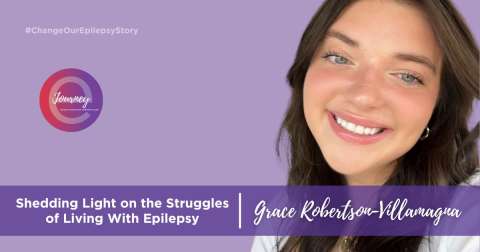Shedding Light on the Struggles of Living With Epilepsy

By Grace Robertson-Villamagna , West Virginia
Person with EpilepsyTuesday, February 27, 2024
I remember the first time I had an absence seizure. I was in my fifth-grade math class when I decided to raise my hand to answer a question asked by my teacher. Suddenly, I completely zoned out, and when I "came back," people were shouting my name and laughing at me. It was tough to face at a young age, especially because I had no idea what was happening. My mom recognized that I was having "spells" and "blanking out," I just thought I had been daydreaming.
It wasn't until a year later that I was diagnosed with childhood absence epilepsy. I was 11 years old, and I struggled to accept that it was happening to me. These absence seizures eventually developed into tonic-clonic seizures. My first tonic-clonic seizure happened at school only four months after my diagnosis. I was horrified, not really from my seizure, but from what people were saying about me. I learned from others in my class that I was being laughed at. I remember returning to school, and one student said "hi" to me and then started to mock my convulsions right before me. Facing this was almost unbearable, and on top of that, I felt I was not being listened to by my doctor, teachers, and other adults when I had the courage to voice my concerns. As a result, I began to view myself with low self-esteem, shame, self-hatred, guilt, anxiety, and depressive thoughts throughout my pre-teen and early teen years.
Through my journey with epilepsy, I continued to have daily absence seizures. I have faced many physical challenges, like sleep, attention, physical activity, and academic challenges, but I was unprepared for the mental and emotional challenges I faced. I had a hard time coping with how people looked at me and not being accepted by my peers. I lost friends, missed out on a lot, and was told that I was not capable of what other people were capable of because I suffered from epilepsy. Not only was I ashamed of my diagnosis, but I realized there is a huge stigma that surrounds people with epilepsy. It is already hard enough living with this disease, but it is even more complicated when your illness is stigmatized.
I'm 16 now and still fighting epilepsy every day. Thankfully, I have found a medicine that controls my seizures, and I don't let epilepsy stop me from the activities that I love. However, I still struggle with paying attention and the emotions that come with having epilepsy. Although epilepsy can take a toll on me, I am so grateful to be surrounded by such a loving community that has helped me every step of the way. Reading about other journeys and connecting with people with similar experiences made me realize I am not alone. I also realized that I would not let my self-hatred – and epilepsy – win over my goals and aspirations. As I got stronger advocating for others, I also advocated for myself. I began to overturn the negative thoughts people have about epilepsy by sharing the struggles that we face.
I still have days when I am sad, but I have learned to feel those emotions and channel them to make me an even stronger advocate and fighter. I don't love having epilepsy, but I do love myself. I love the person I am, even though I have restrictions on my life. I love the community I am so lucky to have right by my side. I love that I can fearlessly talk about epilepsy and the negative stigmas associated with it - and be heard.
Most people never think that something like epilepsy could happen to them until it does. I wasn't prepared, and I don't think anybody is. Remember, you are not alone on your journey. No matter how hard it gets, do not let epilepsy define who you are! Live your life to the fullest and surround yourself with happiness. Epilepsy can put a lot of restrictions on your life, but it can never take away who you truly are.
Reviewed By: Sara Wyen
